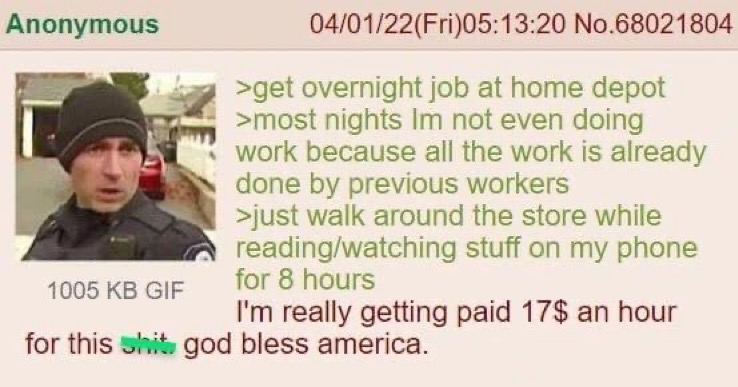this post was submitted on 08 Jan 2025
422 points (93.6% liked)
Greentext
4741 readers
1336 users here now
This is a place to share greentexts and witness the confounding life of Anon. If you're new to the Greentext community, think of it as a sort of zoo with Anon as the main attraction.
Be warned:
- Anon is often crazy.
- Anon is often depressed.
- Anon frequently shares thoughts that are immature, offensive, or incomprehensible.
If you find yourself getting angry (or god forbid, agreeing) with something Anon has said, you might be doing it wrong.
founded 1 year ago
MODERATORS
you are viewing a single comment's thread
view the rest of the comments
view the rest of the comments

Not disagreeing with the idea, but it seems like this would also have the side effect of incentivizing employers to aggressively and artificially reduce wages and pass that burden on to the taxpayer, if you're eliminating minimum wage.
I think it's an interesting idea, but one that seems prone to abuse by unethical parties. Not that our current system is immune to that either.
My state has no minimum wage, so we inherit the federal minimum wage ($7.25 IIRC), yet starting wages tend to be $10-12 in my suburb (probably higher closer to downtown) and median is $13 for fast food.
Yeah, companies will probably try to reduce wages, especially if those wages are essentially subsidized by NIT. But at least in my area, that would only happen if worker supply increases (in this case from people quitting worse jobs). Since almost nobody actually works for minimum wage here, I don't think that's a major concern.
On net, workers would probably be better off. I think we'd see a bit more intentional unemployment, which should drive wages up instead of down.
The main people who would lose out are middle class people relying on Social Security for retirement. We could balance that by removing the income cap on Social Security to preserve some traditional benefit for retirees (I propose income caps for benefits).